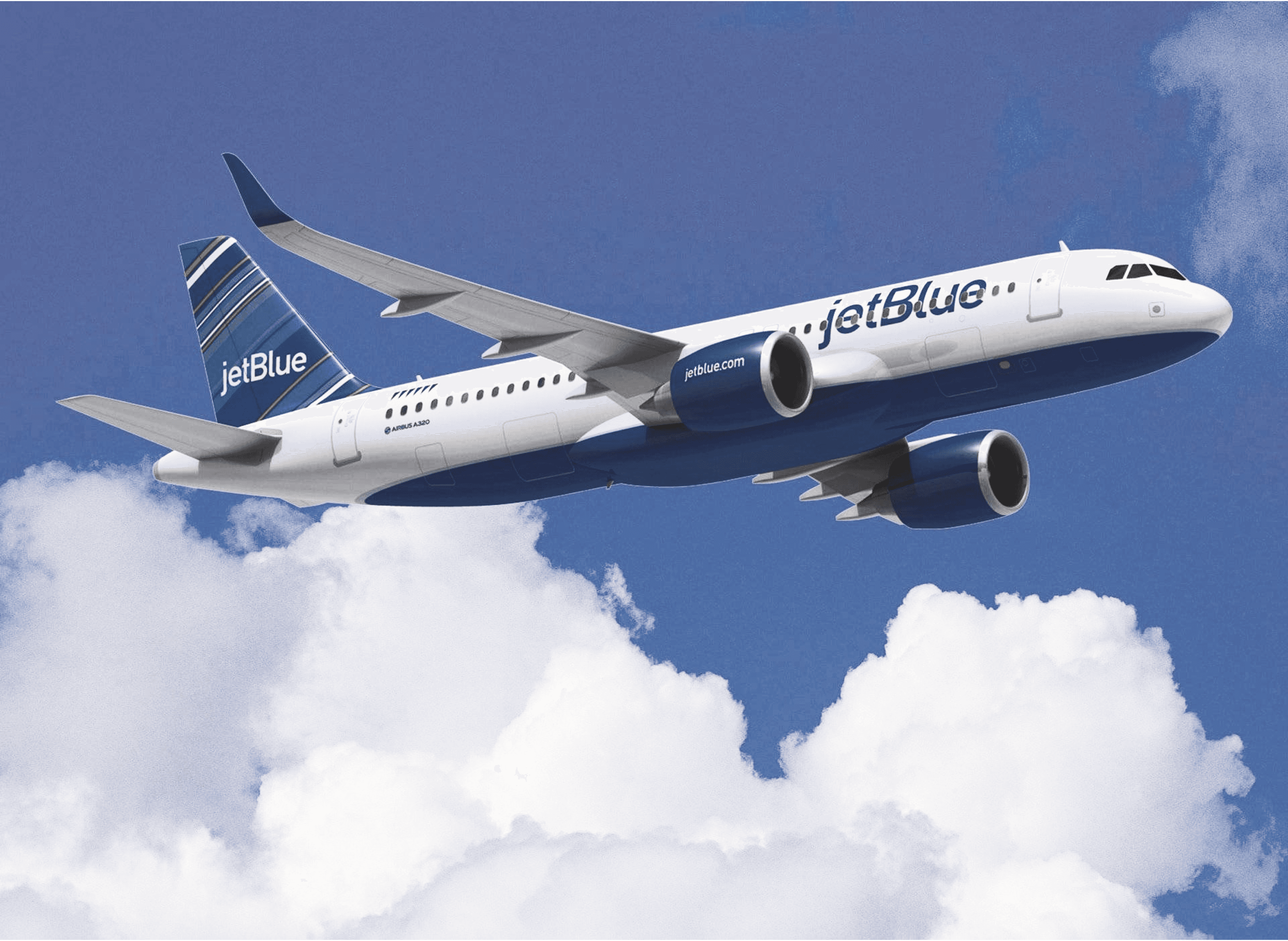
JetBlue invests in sustainable aviation fuel
To help achieve their ambitious net zero by 2040 goal, JetBlue selected Carbon Direct to develop a diversified sustainable aviation fuel (SAF) procurement strategy.


JetBlue invests in sustainable aviation fuel
To help achieve their ambitious net zero by 2040 goal, JetBlue selected Carbon Direct to develop a diversified sustainable aviation fuel (SAF) procurement strategy.

JetBlue invests in sustainable aviation fuel
To help achieve their ambitious net zero by 2040 goal, JetBlue selected Carbon Direct to develop a diversified sustainable aviation fuel (SAF) procurement strategy.

Overview
Key results
Research and development of a forward-looking market analysis for SAF, assessing various SAF technologies for commercial readiness and offtake
Delivery of a data-driven, diversified SAF procurement strategy for the near term (2025 - 2030) and long term (2030+)
In-depth analysis of SAF suppliers and global policy landscape, to help anticipate and address future compliance obligations
About JetBlue
Born at JFK in 2000, JetBlue is a global, award-winning travel company. JetBlue is New York’s Hometown Airline and a leading carrier in Boston, Fort Lauderdale-Hollywood, Los Angeles, Orlando, and San Juan, carrying customers to more than 100 cities throughout the United States, Latin America, the Caribbean, Canada, and Europe. With their mission to inspire humanity, JetBlue is committed to supporting future generations and their environments through youth programs and climate leadership.
From feedstocks to technical readiness, Carbon Direct has the expertise to help us navigate the extremely complex SAF landscape and meet our emissions abatement targets in 2030 and beyond.
Sara Bogdan
Managing Director of Sustainability and ESG, JetBlue
The challenge: scaling SAF for emissions abatement
As a climate leader in aviation, JetBlue recognizes that what is good for the environment is good for business. In 2020, they announced their goal to reach net zero carbon emissions by 2040. Achieving that as an aviation company requires decarbonization at the multi-megatonne scale.
JetBlue has identified six key pathways for decarbonization:
aircraft efficiency
fuel optimization
sustainable aviation fuel (SAF)
electric ground operations
carbon offsetting
technology partnerships
One specific target is to convert 10% of their jet fuel to blended SAF by 2030. Based on 2019 fuel usage and future projections, that could amount to over 80 million gallons per year.
While SAF has emerged as the primary means of emissions abatement for the aviation industry, technical readiness, available supply, and cost challenge the industry’s ability to abate emissions at scale. For example, in 2022 SAF production totaled just 240,000 tonnes (less than 0.1% of global jet fuel demand) and the cost of SAF today can be more than double that of conventional jet fuel. Addressing these systemic challenges begins with deep analysis across the variety of SAF pathways.



Image source:
JetBlue
The solution: developing a diversified SAF strategy
To better understand these SAF production pathways—as well as the subsidies and policy considerations that will influence the future evolution of the SAF market—JetBlue selected Carbon Direct to develop a forward-looking market analysis and a diversified SAF procurement strategy. Carbon Direct worked with JetBlue to assess various SAF technologies for commercial readiness and offtake in the immediate, near term (2025 - 2030), and long term (2030 and beyond).
“Carbon Direct helped provide the data and analysis to be thoughtful on our approach to SAF,” says Sara Bogdan, Managing Director of Sustainability and ESG at JetBlue. “Their expert team gave us the confidence we need to identify and pursue the most promising SAF pathways, helping us bring the market to scale and achieve our climate goals.”
What's next: analyzing policy and compliance obligations
In addition, Carbon Direct analyzed JetBlue’s existing SAF pipeline to optimize their supplier set and prepare for the future. This included an in-depth analysis of current policies across key regions, like the United States and Europe, and international initiatives, like CORSIA, SBTi, and SABA. Understanding how their current SAF suppliers do or do not meet anticipated compliance obligations will help to ensure that JetBlue meets both compliance and voluntary targets in the future.
“
Carbon Direct’s expert team gave us the confidence we need to identify and pursue the most promising SAF pathways, helping us to achieve our climate goals.
Sara Bogdan
Managing Director of Sustainability and ESG, JetBlue
Overview
Key results
Research and development of a forward-looking market analysis for SAF, assessing various SAF technologies for commercial readiness and offtake
Delivery of a data-driven, diversified SAF procurement strategy for the near term (2025 - 2030) and long term (2030+)
In-depth analysis of SAF suppliers and global policy landscape, to help anticipate and address future compliance obligations
About JetBlue
Born at JFK in 2000, JetBlue is a global, award-winning travel company. JetBlue is New York’s Hometown Airline and a leading carrier in Boston, Fort Lauderdale-Hollywood, Los Angeles, Orlando, and San Juan, carrying customers to more than 100 cities throughout the United States, Latin America, the Caribbean, Canada, and Europe. With their mission to inspire humanity, JetBlue is committed to supporting future generations and their environments through youth programs and climate leadership.
From feedstocks to technical readiness, Carbon Direct has the expertise to help us navigate the extremely complex SAF landscape and meet our emissions abatement targets in 2030 and beyond.
Sara Bogdan
Managing Director of Sustainability and ESG, JetBlue
The challenge: scaling SAF for emissions abatement
As a climate leader in aviation, JetBlue recognizes that what is good for the environment is good for business. In 2020, they announced their goal to reach net zero carbon emissions by 2040. Achieving that as an aviation company requires decarbonization at the multi-megatonne scale.
JetBlue has identified six key pathways for decarbonization:
aircraft efficiency
fuel optimization
sustainable aviation fuel (SAF)
electric ground operations
carbon offsetting
technology partnerships
One specific target is to convert 10% of their jet fuel to blended SAF by 2030. Based on 2019 fuel usage and future projections, that could amount to over 80 million gallons per year.
While SAF has emerged as the primary means of emissions abatement for the aviation industry, technical readiness, available supply, and cost challenge the industry’s ability to abate emissions at scale. For example, in 2022 SAF production totaled just 240,000 tonnes (less than 0.1% of global jet fuel demand) and the cost of SAF today can be more than double that of conventional jet fuel. Addressing these systemic challenges begins with deep analysis across the variety of SAF pathways.



Image source:
JetBlue
The solution: developing a diversified SAF strategy
To better understand these SAF production pathways—as well as the subsidies and policy considerations that will influence the future evolution of the SAF market—JetBlue selected Carbon Direct to develop a forward-looking market analysis and a diversified SAF procurement strategy. Carbon Direct worked with JetBlue to assess various SAF technologies for commercial readiness and offtake in the immediate, near term (2025 - 2030), and long term (2030 and beyond).
“Carbon Direct helped provide the data and analysis to be thoughtful on our approach to SAF,” says Sara Bogdan, Managing Director of Sustainability and ESG at JetBlue. “Their expert team gave us the confidence we need to identify and pursue the most promising SAF pathways, helping us bring the market to scale and achieve our climate goals.”
What's next: analyzing policy and compliance obligations
In addition, Carbon Direct analyzed JetBlue’s existing SAF pipeline to optimize their supplier set and prepare for the future. This included an in-depth analysis of current policies across key regions, like the United States and Europe, and international initiatives, like CORSIA, SBTi, and SABA. Understanding how their current SAF suppliers do or do not meet anticipated compliance obligations will help to ensure that JetBlue meets both compliance and voluntary targets in the future.
“
Carbon Direct’s expert team gave us the confidence we need to identify and pursue the most promising SAF pathways, helping us to achieve our climate goals.
Sara Bogdan
Managing Director of Sustainability and ESG, JetBlue
Overview
Key results
Research and development of a forward-looking market analysis for SAF, assessing various SAF technologies for commercial readiness and offtake
Delivery of a data-driven, diversified SAF procurement strategy for the near term (2025 - 2030) and long term (2030+)
In-depth analysis of SAF suppliers and global policy landscape, to help anticipate and address future compliance obligations
About JetBlue
Born at JFK in 2000, JetBlue is a global, award-winning travel company. JetBlue is New York’s Hometown Airline and a leading carrier in Boston, Fort Lauderdale-Hollywood, Los Angeles, Orlando, and San Juan, carrying customers to more than 100 cities throughout the United States, Latin America, the Caribbean, Canada, and Europe. With their mission to inspire humanity, JetBlue is committed to supporting future generations and their environments through youth programs and climate leadership.
From feedstocks to technical readiness, Carbon Direct has the expertise to help us navigate the extremely complex SAF landscape and meet our emissions abatement targets in 2030 and beyond.
Sara Bogdan
Managing Director of Sustainability and ESG, JetBlue
The challenge: scaling SAF for emissions abatement
As a climate leader in aviation, JetBlue recognizes that what is good for the environment is good for business. In 2020, they announced their goal to reach net zero carbon emissions by 2040. Achieving that as an aviation company requires decarbonization at the multi-megatonne scale.
JetBlue has identified six key pathways for decarbonization:
aircraft efficiency
fuel optimization
sustainable aviation fuel (SAF)
electric ground operations
carbon offsetting
technology partnerships
One specific target is to convert 10% of their jet fuel to blended SAF by 2030. Based on 2019 fuel usage and future projections, that could amount to over 80 million gallons per year.
While SAF has emerged as the primary means of emissions abatement for the aviation industry, technical readiness, available supply, and cost challenge the industry’s ability to abate emissions at scale. For example, in 2022 SAF production totaled just 240,000 tonnes (less than 0.1% of global jet fuel demand) and the cost of SAF today can be more than double that of conventional jet fuel. Addressing these systemic challenges begins with deep analysis across the variety of SAF pathways.



Image source:
JetBlue
The solution: developing a diversified SAF strategy
To better understand these SAF production pathways—as well as the subsidies and policy considerations that will influence the future evolution of the SAF market—JetBlue selected Carbon Direct to develop a forward-looking market analysis and a diversified SAF procurement strategy. Carbon Direct worked with JetBlue to assess various SAF technologies for commercial readiness and offtake in the immediate, near term (2025 - 2030), and long term (2030 and beyond).
“Carbon Direct helped provide the data and analysis to be thoughtful on our approach to SAF,” says Sara Bogdan, Managing Director of Sustainability and ESG at JetBlue. “Their expert team gave us the confidence we need to identify and pursue the most promising SAF pathways, helping us bring the market to scale and achieve our climate goals.”
What's next: analyzing policy and compliance obligations
In addition, Carbon Direct analyzed JetBlue’s existing SAF pipeline to optimize their supplier set and prepare for the future. This included an in-depth analysis of current policies across key regions, like the United States and Europe, and international initiatives, like CORSIA, SBTi, and SABA. Understanding how their current SAF suppliers do or do not meet anticipated compliance obligations will help to ensure that JetBlue meets both compliance and voluntary targets in the future.
“
Carbon Direct’s expert team gave us the confidence we need to identify and pursue the most promising SAF pathways, helping us to achieve our climate goals.
Sara Bogdan
Managing Director of Sustainability and ESG, JetBlue
Connect with an expert
Get answers to your decarbonization questions and explore carbon management solutions.
Connect with an expert
Get answers to your decarbonization questions and explore carbon management solutions.
Connect with an expert
Get answers to your decarbonization questions and explore carbon management solutions.